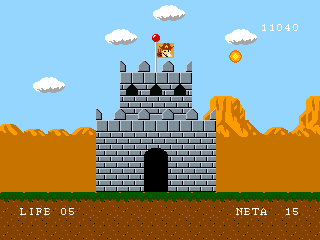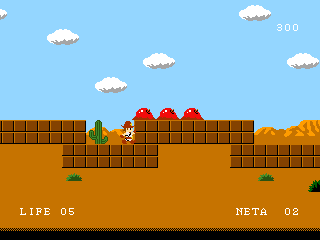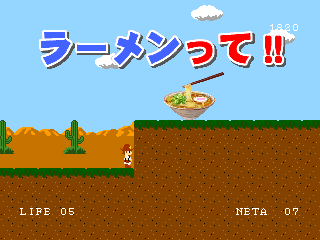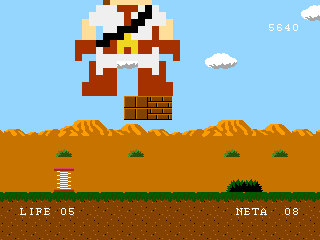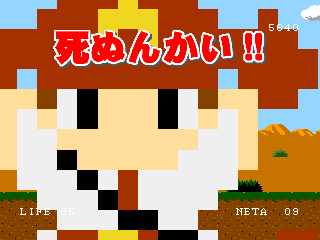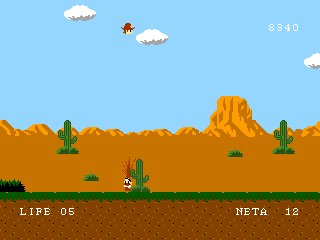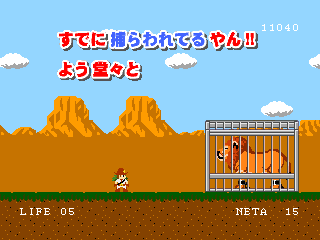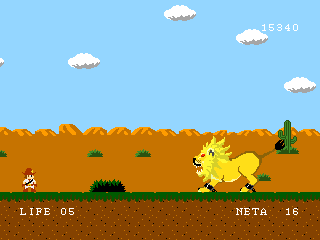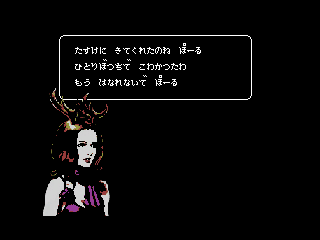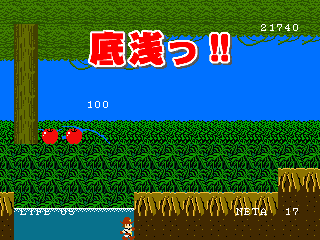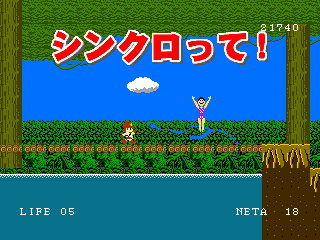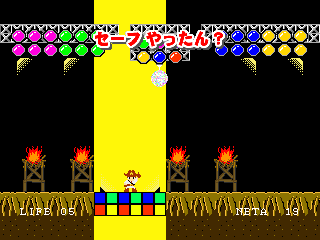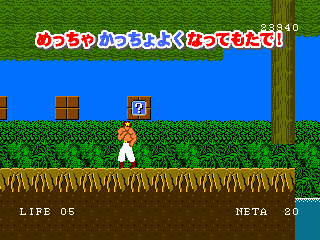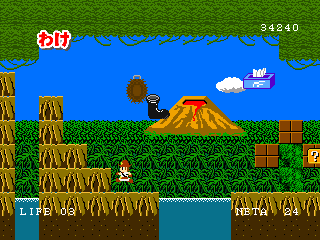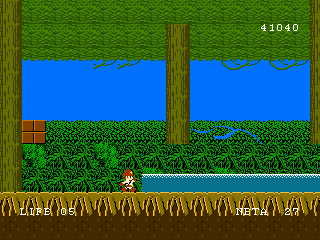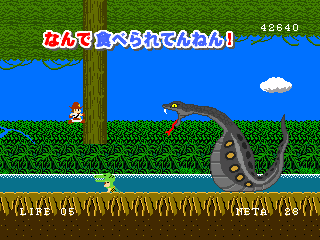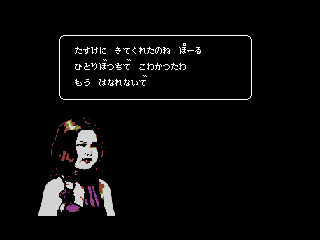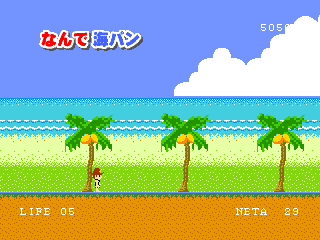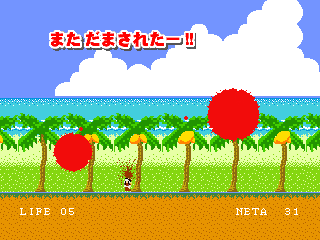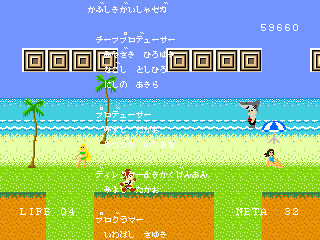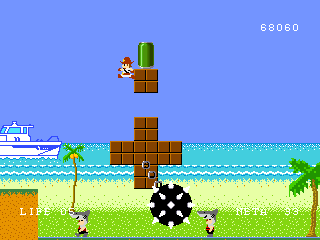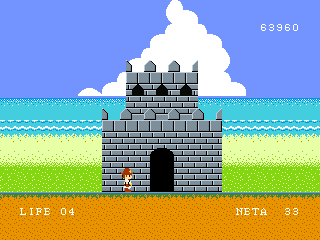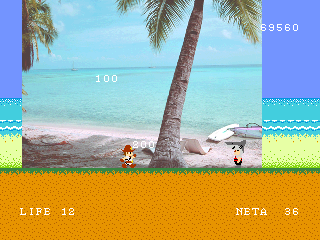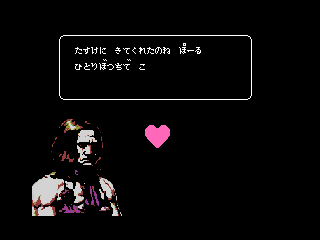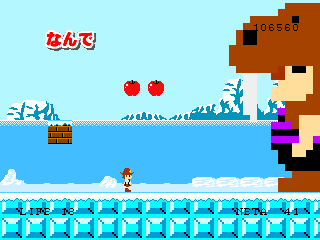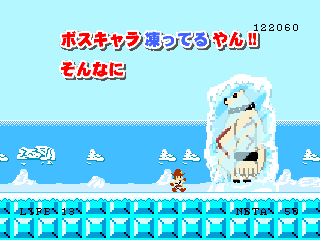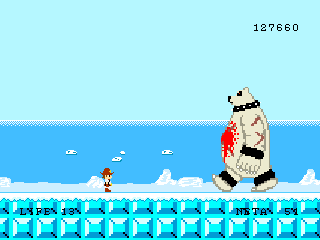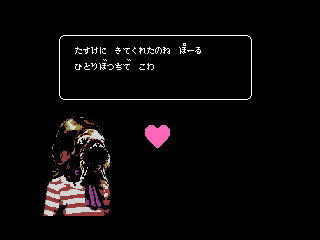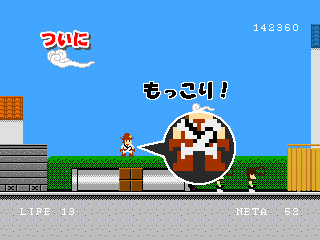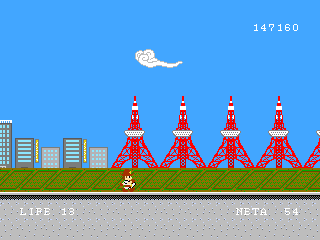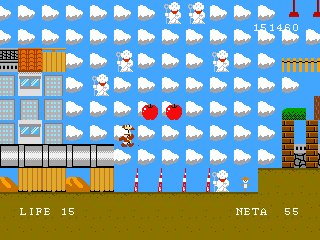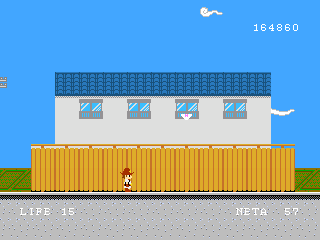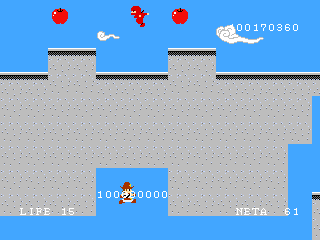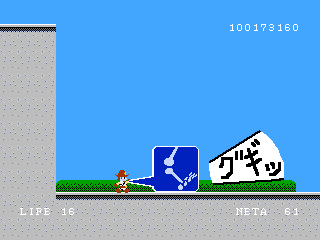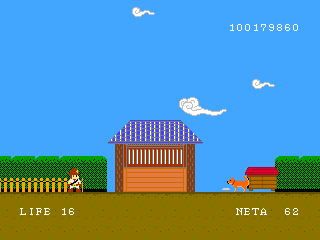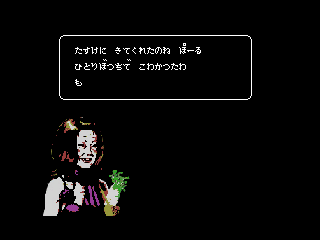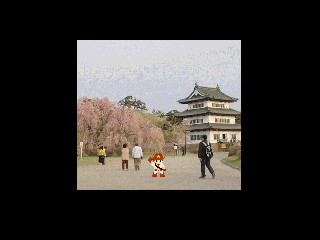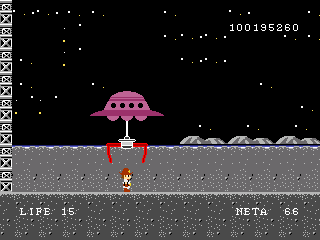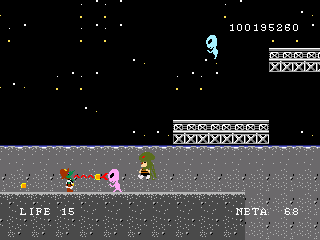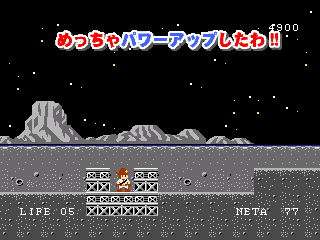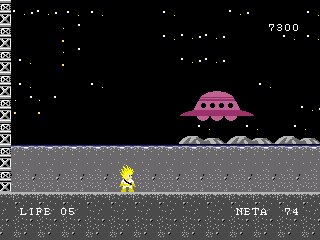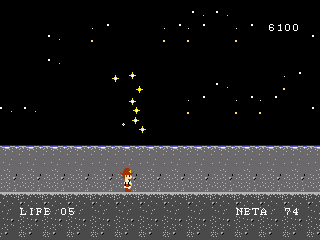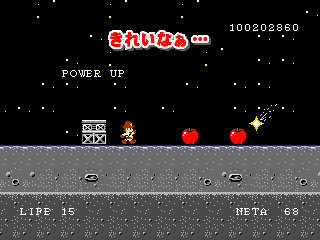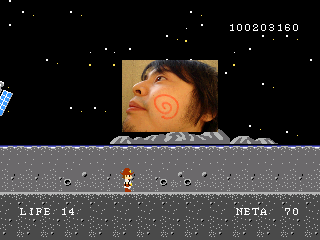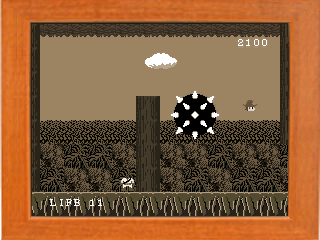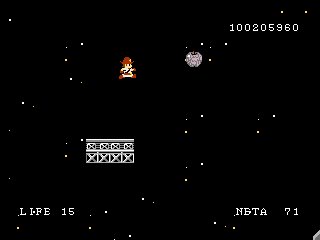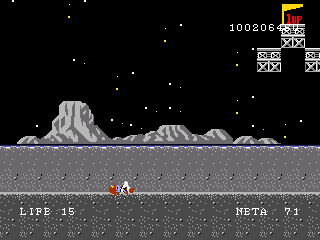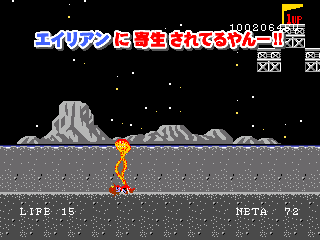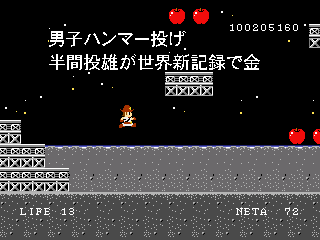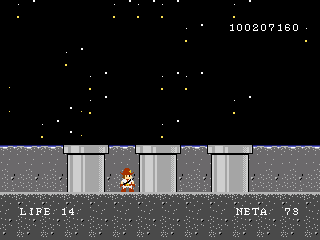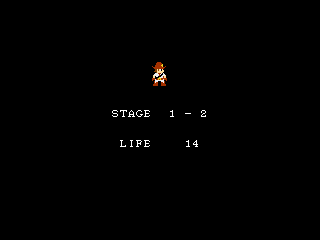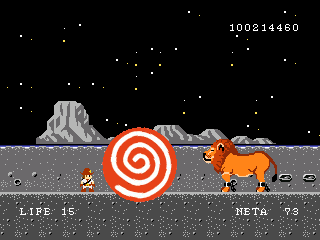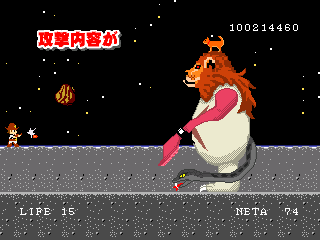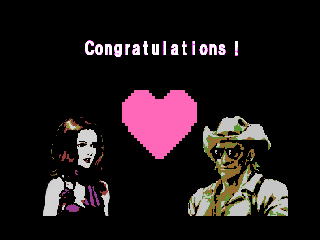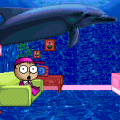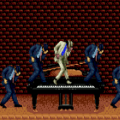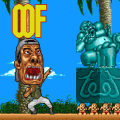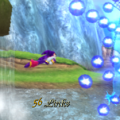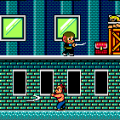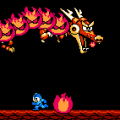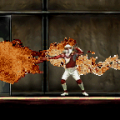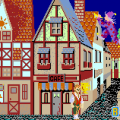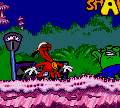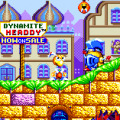The advent of digital distribution in console games allowed for a wider variety of games to appear, including a boom of titles aimed to appeal to 8 and 16-bit gaming nostalgia. While the likes of Mega Man 9 and 10, Scott Pilgrim and Konami’s Rebirth series celebrates the high points of the days of old, Sega’s WiiWare title Pole no Daibōken instead seeks to mock it, as a tribute to the vast majority of underwhelming Famicom and Master System games that our rose-tined glasses have forced us to forget.
Pole no Daibouken (“Pole’s Great Adventure”; the hero’s name is also sometimes transliterated as “Paul”) puts you in the shoes of a cowboy-type guy, whose girlfriend, Sharon, has been kidnapped by a ruthless poacher. In treading through six generic video game-esque stages, Pole must fight through legions of captured animals, who acts as enemies. Sort of. Most regular enemies are humans wearing animal mask, while bosses include gigantic lions, snakes, and polar bears. Whatever messages about the evils of poaching are totally muddled when you’re massacring (admittedly, not exactly helpless) animals, but that’s also the point. The cutscenes are displayed in a realistic-ish fashion – as realistic as four colors can allow, anyway – and completely clash with not only the cartoony “box art” (as shown when you begin the game on the Wii system menu) but the in-game graphics as well.
The gameplay itself is hardly special and is intentionally derivative. It uses a limited color palette, chunky, pixellated sprites, and a catchy yet slightly irritating chiptune soundtracks. Pole’s main weapon of attack is a gun, which can be powered up twice. The land is strewn with bricks and question mark blocks – the only difference between this and Super Mario Bros. is that they need to be shot to be broken, rather than smashed from beneath. The landscape is strewn with apples, which will given bonus points, but nothing else. A single hit will kill you, but it’s still an incredibly easy game. The focus is, instead, on the numerous silly gags.
Beyond parodying the loose grips on storytelling common in 8-bit games, Pole no Daibōken regularly skewers the more annoying flaws of the era. It can and will kill you suddenly and unfairly, some pits are literally so long as to be uncrossable, and it will even glitch out at some point. (This is not particularly frustrating from a gameplay perspective, because checkpoints are common and extra lives are all over the places.) Background tiles are reused or improperly implemented, and in one area overloaded with enemies, will begin to slowdown and flicker. Beyond that, other tropes are played with and subverted. On two separate occasions, the boss theme will begin playing, only to show said boss to be harmless and easily bypassed. Each stage ends with a Super Mario Bros.-style castle – one level plops you right in front it, leaving the only non-challenge to walk right through the door. Another stage is just an expansive stretch of nothingness that consists of nothing more than approximately two minutes of running forward. You can grab energy drinks, which will grant you temporarily invincibility, and as you charge through a legion enemies conveniently set up to enjoy this strength, the music breaks out into a silly sentai-type theme.
All throughout the game, every joke triggers an interjection from an unseen narrator, whose spoken lines also appear as large red text. Pole no Daibouken is rooted in a Japanese comedy routine known as “manzai”. A variation of the wacky guy/straight guy shtick, as known to Americans in Abbott and Costello, it involves two men – one, the “boke”, acting as sort of a dimwit, while the other, the “tsukkomi”, points out the other’s stupidity. In this case, the game itself acts as the boke, doing all manner of stupid things, while the narrator is the tsukommi, loudly overreacting at how ridiculous everything is. Obviously, when jokes are explained with gigantic letters and exuberant yammering, all sense of subtly goes right out the window. And unfortunately, it cannot be disabled, leaving it the most annoying aspect of the game.
Outside of the jokes, there’s not much of a reason to play this game. Although it aims to be a kusoge, it’s not blithely terrible enough to qualify, nor is it compelling enough to stand on its own. Like most comedy, the jokes fail to have the same impact the second time around, although getting friends to play it and watching their reactions is amusing. The game promotes replay value by making numerous jokes hidden – there are 100 in total, which are counted at the bottom of the screen and can be rewatched individually at any time – and a single playthrough will uncover approximately 75% of them. A second loop is substantially harder, at least.
Pole no Daibōken was never localized, for reasons not explained, although they are easy to surmise. The manzai stuff will probably seem stupid to most non-Japanese, and some of the jokes get on the randy side, though either of these could’ve easily been toned down or eliminated without losing much. Due to Nintendo’s nimrod approach to digital distribution, it is practically impossible to buy this game without purchasing a Japanese Wii or jumping through numerous hoops to hack your system and access the Japanese store. Since both Nintendo and Sega have spelled out that they do not desire your foreign money, please do not feel guilty about pirating it. However, if you are unable to play it, many of the most amusing jokes are listed below.
Links:
Siliconera A grouping of articles about the game.
Official blog In Japanese.
Official site Also in Japanese.
Game Lando A wiki detailing the locations of all of the jokes. In Japanese.
Gags
Stage 1
The very first gag triggers when you try to grab an apple, which will reflect Pole right off with a metallic “ching!” noise. Most of the gags in this stage revolve around the apples being weird – here, they’re rotting, while later ones can be found eaten to the core.
Inside the question mark blocks you will, of course, find mushrooms, but none of them work they way you’d expect them to. This one will cause Pole to grow…
This is the first really good gag that will convince practically anyone of the game’s worth. So the first level is filled with these cacti, which are obviously background objects. Except this one totally random one isn’t, and will not only kill Pole, but cause his head to fly right off, sprouting blood onto the screen.
So the boss music starts, and you get pumped up to fight something big… except he’s locked harmlessly in a cage, allowing you to stroll right by.
At the end of each stage, Pole comes across his girlfriend… except it’s actually one of the enemies in a very poorly thought out disguise. In this case, she is wearing antlers.
Stage 2
One of the first jumps in the second stage is literally impossible to make. But that’s okay, because the pit wasn’t programmed properly, so you can safely walk on the bottom of the screen.
There’s another pit you can fall down (although unlike the earlier one, it’s not mandatory) but instead Pole will rise from the chasm on a dance stage, complete with lights and a disco ball.
The mushroom obtained from this question mark block will turn Pole into a larger, “realistic” version of his sprite. It offers no real advantage though.
So here the background tiles aren’t implemented correctly, so the water just appears above the ground.
This gigantic snake spews enemies. In this case, he vomits one that’s half digested, who continues to crawl towards you anyway. Gross.
Stage 3
Stage 3 is a beach stage, where Pole begins in his boxer shorts. The first mushroom you find will restore his regular clothing.
This is a repeat of the cactus joke from earlier on, except a bit sillier, because this time you’re randomly killed by a totally innocuous palm tree, one that’s totally indistinguishable from the rest.
Grab this green soda can, and you’ll get 7-up (that is, seven 1-ups).
Stage 4
A few enemies in this stage are gigantic. The narrator makes mention about tampering with their DNA.
This joke is a repeat of the earlier one with the lion, though not quite as funny. The first time you meet him, he’ll wave his arms and walk away, but the second time, he’s just frozen harmlessly in ice.
When you actually fight him later on, each successive hit will make him bleed more and more, until his sprite is almost entirely covered in red splotches. It’s hilariously gory.
Stage 5
The first mushroom in this stage will give Pole a massive erection, which he will keep for the rest of the stage.
Yes, there are several Tokyo Towers in the background, mocking the laziness of certain graphic designers in the days of old.
At an earlier point in the game, the game slows down quite a bit and the graphics start flickering, as the narrator notes that there’s too many sprites on screen. Later, it totally glitches up, though it’s still easily playable.
It’s hard to tell until the narrator comments, but those are a pair of panties in the window that you can steal.
So this apple hidden at the bottom of the screen will give you one hundred million points, thereby sort of negating the entire scoring system.
Upon falling from this ledge, Pole will break his leg, and be forced to hobble along until he reaches the end of the stage.
This boss is a harmless little shiba inu dog…at least in the first loop. In the second loop he’s one of the hardest bosses of the game, as he flies around the screen and litters it with shurikens.
So Pole takes it upon himself to take a vacation and snap various pictures of himself around Japan, but it’s not over yet!
Stage 6
Whilst on the moon, Pole gets picked up by a UFO catcher (literally, as it’s the Japanese name for those crane arcade games).
After escaping, Pole is turned into a hideous green mutant thing, which can attack enemies with his tongue.
Okay, this is actually earlier in the stage. If you enter the Konami code here, you’ll hear a little jingle, but nothing appears to happen.
But when you get picked up by the UFO, you’ll turn Super Saiyan. Sadly, it wears off by the time the second UFO sounds around.
This is the big dipper… and the bottom star glows as Pole passes by, an omen of death as seen in Fist of the North Star.
The narrator muses at how pretty this shooting star is, but of course, it will kill Pole. Earlier in this world, you can find Earth in the background, and blow it up with your gun.
Pole notices a black hole, which then turns into a squiggly mark on the side of this guy’s cheek? It looks sorta like the Dreamcast logo.
Get killed by one of the spiked balls here, and you’ll be treated to a sepia-toned retrospective of many of Pole’s previous deaths, whether you’ve found them or not. Here is a memory from the first stage, where Pole can get decapitated.
A Japanese TV-style news broadcast will appear out of nowhere, but the text cycles far too fast, making it nearly impossible to read, even if you understand the language.
…gaahhh! You’ll be transported way back to the beginning of the game! Luckily, you can just quit out and restart the game at stage six, but this is still cruelly amusing (and a reference to the backward warps in the Japanese Super Mario Bros. 2).
You’ll face each of the bosses one by one, but before they can attack they get sucked into this swirly void….
…only to be spit out back at you, in the form of a gigantic mutant monstrosity. Note how the dog isn’t actually part of the creature but is just sitting on its head.
Congratulations! Here’s the real Sharon! It’s weird, though, that considering that evil poacher taunts you every stage, you don’t actually get to fight him…? Anyway, after this screen, it immediately starts you back at Stage 1-1, although the first apple you grab will seemingly freeze the game, until the credits roll. (For real, this time.)
